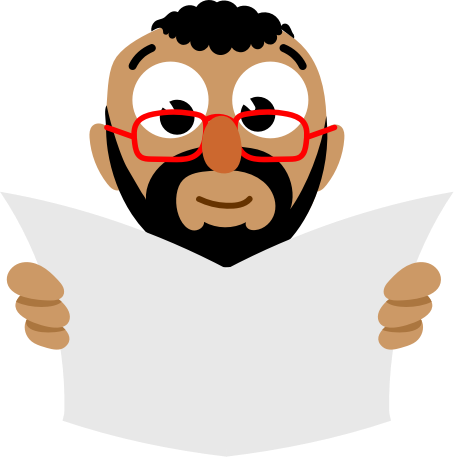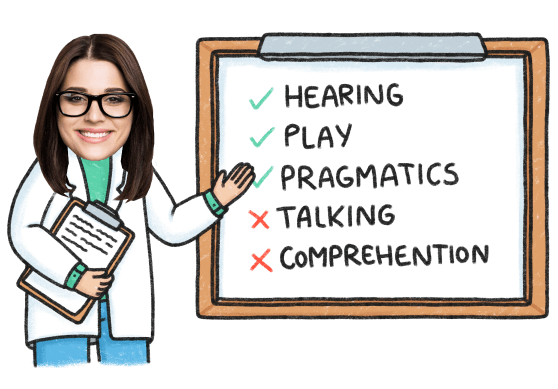25 Speech and Language Terms Every Parent Should Know
Jan 15, 2022 As you enter parenthood, the world of child development can be overwhelming, especially when considering speech, language, and communication. It's often a world parents haven't even thought much about until now.
Whether we are speaking to teachers, health visitors, or speech therapists, there is a lot of new information for any parent to digest and understand. So, we thought it would be useful to break down some of the frequently used terms in the area of Speech and Language to give you a better understanding of what it all means!
The Speech Learning App for Kids
Speech Blubs is a language therapy app with a vast library of more than 1,500 activities, face filters, voice-activated activities, and educational bonus videos. Start your free trial today and watch your little one learn right away!
Boost Your Child’s Speech Development!
Improve language & communication skills with fun learning!

Below you can find the main terms to better understand your speech therapist or pediatrician, so let’s dive in!

Speech
When professionals talk about “speech” they are talking about the sounds that we make when we say words.
For example: the word “cat” is made up of three sounds. The ‘c,’ the ‘a,’ and the ‘t’ – two consonants and one vowel sound.
Some children find it hard to hear, learn, and make these sounds when they speak, resulting in unclear speech. A child making a speech error might say “tat” instead of “cat,” or “fis” instead of “fish.”
All children make speech errors at some stage in their development. Learning speech sounds is a gradual process, normally starting at around 6 months when they babble, up until about 6 years.
Many of the errors we hear can be “typical” or normal for the child’s age.
For example: It would be normal for a 1-year-old child to struggle with the word “telly,” for a 2-year-old to struggle with the word “red,” or a 4-year-old to struggle with the word “treasure.”
Some children require more time and help to develop their speech sounds and may need some extra support. You can start off by taking the Speech Blubs assessment, as it will give you an indicator of your child’s current sound development, and will let you know if it might be helpful to contact your local speech and language therapy team. There are also great activities on the app for learning and practicing the early sounds in a fun and interactive way.
Language
‘Language’ refers to the words that we hear and say. This includes all of our vocabulary, including things like nouns, verbs, and adjectives.
Language is split up into two parts, our understanding of language (receptive language) and our use of language (expressive language).
The age children develop their receptive and expressive language differs from child to child, and there is a wide variation of what is “normal.” Children can have difficulties with either or both of these areas, however, if you are concerned you can take the Speech Blubs assessment and contact your local health visitor or speech therapist.
The Speech Blub App is full of language resources you can check out and use to support your child’s development in this area.
Understanding of Language
Our children need to not only hear the words we say, but also make sense of them, understand the vocabulary, hear how the words go together, and understand what the speaker is trying to communicate.
By the time a child approaches their first birthday, we would expect them to follow a simple one-word command, by two years a two-part command, and by three years a 3-step command. By 4 years, we would expect then to understand stories and more complex language such as adjectives and concepts.
A child struggling with understanding language may find it difficult to follow instructions, may seem like they are not listening, and make errors when you request things from them.
Using Language
Once a child can understand a word, they then learn to use it for themselves, speaking to request things, reject things, and to comment on things.
At one year they are likely to have a handful of words, at two years around 50 words, and by three years they will often start to put little sentences together. By four years, we would expect sentences to be used most of the time and for strangers to understand what they are saying.
A child struggling with expressive language may find it hard to find the words they want to use, may have a limited vocabulary for their age, or say words in the wrong order.
Social skills
Social skills are more than just saying “hello,” “goodbye,” and “thank you.” Turn-taking, naming and reading emotions, literal vs. non-literal language, social language, negotiation, volume, speed, and reading face and body expressions are just some of the many elements that make up social skills.
Children develop these skills over time, often from their experiences. These skills come more naturally to some than others. A baby often develops the use of eye contact, smiling, responds to her/his name, and learns to recognize those familiar to them within the first 12 months. They start exploring their own emotions and learn they are their own independent person up to the age of two years. Once they turn three, they start to develop an awareness of other people’s emotions, and are able to take turns. By four years, they start to develop awareness, understanding, and some control over their own emotions.
Social skills are a complex area of child development, and children vary greatly (much like adults) in their emotional and social needs and preferences. Many children struggle with social skills such as controlling emotions, turn-taking, and sharing. However, it’s worth keeping an eye out and chatting to a health visitor or speech therapist if you are concerned.

Other Commonly Used Terms
Modelling – means using language so your child can listen, remember, and eventually copy.
Dysphagia – a term that describes difficulties with eating or drinking.
Generalization – when a skill they have learned in a therapeutic activity is carried over to everyday life. For example, they may learn “cat” in the Speech Blubs app. Generalization would be the child then naming a cat when they see one in real life.
Intonation – the rise and fall in the pitch of speech (speaking higher or lower).
Semantics – the meaning of language.
Auditory memory – this is the brain’s ability to remember what it has heard. This can include words, sounds, numbers, etc.
Phonemic awareness – the ability to listen to, think about, and breakdown the sounds within a spoken word, for example, breaking down “telephone” into t-e-l-ee-f-o-n.
Articulation – the movement of facial features to create the speech sounds – the lips, tongue, jaw, and palate.
Palate – the soft and hard palate forms the roof of your mouth.
Grammar – the rules of language on how words can be put together to make sentences.
Dysfluency – when smooth and flowing speech is interrupted with the repeating or lengthening of sounds, words, or pauses (blocks) – aka stammering/stuttering
Glue ear – hearing loss caused by buildup of fluid behind the ear drum.
Makaton – a sign and symbol system based on natural gestures and British Sign Language.
Verbal reasoning – solving problems using language.
Voice – in speech therapy it refers to the quality, pitch, breathiness, and volume of a person’s voice.
Direct therapy – Where the speech therapist works with the child doing specific therapy activities to target a chosen area. The child is aware therapy is taking place.
Indirect therapy – Where a significant adult (parent, teacher, TA, etc.) works with the child, often during relaxed and spontaneous games, play and conversation, targeting a general area of communication development where the child is less aware that therapy is taking place.
Formal Assessment – formalized assessments allows a speech therapist to do a controlled test with which they can then compare the (often numerical) results to a control group of children the same age.
Informal Assessment – informal assessments may be done by a speech therapist, teacher, parent, or therapy assistant to observe, comment on, and test skills using activities, play, or tests that are not standardized.
Vocabulary – the words/language known by a person.

